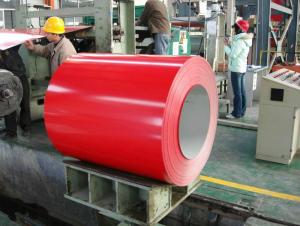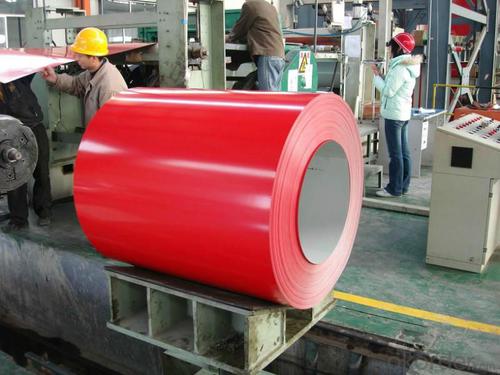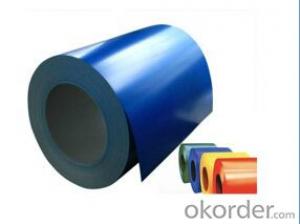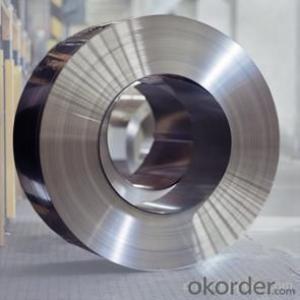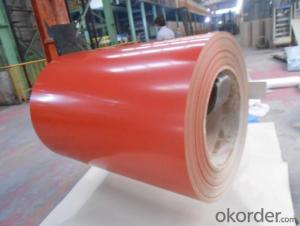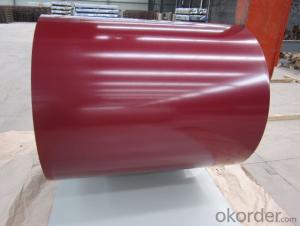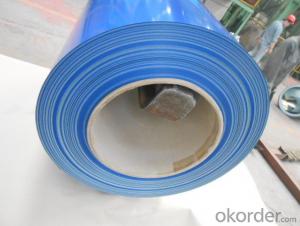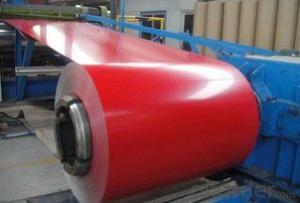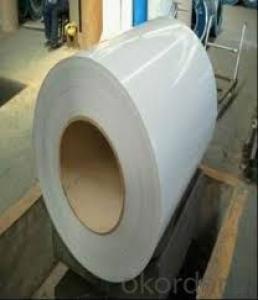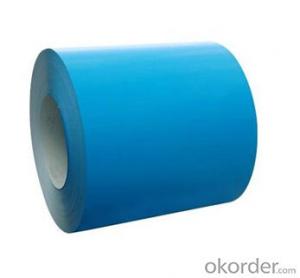Pre-Painted Color Coated GI Steel Sheet in High Quality
- Loading Port:
- shanhai
- Payment Terms:
- TT or LC
- Min Order Qty:
- 50 m.t.
- Supply Capability:
- 10000 m.t./month
OKorder Service Pledge
OKorder Financial Service
You Might Also Like
1.Structure of Color Coated GI/GL Steel Coil Description
With GI (aluzinc) as base metal, after pretreatment (degrease and chemical treatment) and liquid dope with several layers of color, then after firing and cooling, finally the plate steel is called pre-painted galvanized (aluzinc) steel. Pre-painted galvanized steel is good capable of decoration, molding, corrosion resistance. It generally displays workability, durability and weather resistance.
2.Main Features of the Color Coated GI/GL Steel Coil
• Excellent corrosion resistance
• Excellent weather resistance
• Capability of decoration, molding, corrosion resistance
• Workability, durability
• Excellent heat resistance performance
• High strength
• Good formability
• Good visual effect
3. Color Coated GI/GL Steel Coil Images
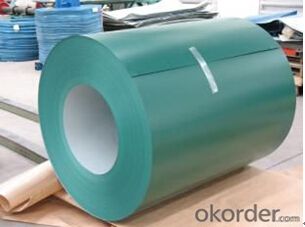
4.Color Coated GI/GL Steel Coil Specification
Quality standar: JIS G3312 CGCC & CGLCC
Hardness of P: Both soft and hard quality are available
Surface finish: with or without protect film
Thickness : 0.14-1.20 mm
Width : 914mm, 1000mm, 1220mm and 1250mm, thickness 600-1250mm is available
Finish by coil or sheet: Both sheet and coil are available
8Zinc coating: 60-275G/M2, both sides
Paint thickness for top side : 5 micron primer + (10-20) microns modified polyester, green color.
Paint thickness for back side: (5-10) microns Epoxy
Weight per coil: 4-6 tons, also can be upon customer's requirements
Max loading weight in one 20ft container : 25 tons generally
5. FAQ of Color Coated GI/GL Steel Coil
We have organized several common questions for our clients,may help you sincerely:
1. What is the minimum order quantity ?
Our MOQ is 50mt for each size. And we will consider to give more discount if you make big order like 1000 tons and more. Further more, the more appropriate payment term your offer the better price we can provide.
2. How long can we receive the product after purchase?
Usually within thirty working days after receiving buyer’s advance payment or LC. We will arrange the factory manufacturing as soon as possible. The cargo readiness usually takes 15-25 days, but the shipment will depend on the vessel situation.
3. How to guarantee the quality of the products?
We have established the international advanced quality management system,every link from raw material to final product we have strict quality test;We resolutely put an end to unqualified products flowing into the market. At the same time, we will provide necessary follow-up service assurance.
- Q: I need to know where to go online to buy a steel cage for a wrestling ring.. Somebody please assist me?
- Steel cages are made from scrap. From either loose metal or loose chains. There might be some on eBay that would be man-made
- Q: How do steel coils contribute to sustainable construction?
- Steel coils contribute to sustainable construction in several ways. Firstly, steel is a highly durable and long-lasting material, which means that structures built using steel coils have a longer lifespan and require fewer repairs and replacements. This reduces the overall environmental impact of construction by minimizing waste and resource consumption. Additionally, steel is a highly recyclable material, and steel coils can be easily recycled at the end of their life cycle, reducing the need for new steel production and conserving natural resources. Furthermore, steel is a fire-resistant material, providing enhanced safety and reducing the risk of structural damage during fire incidents. Overall, the use of steel coils in construction promotes sustainability by minimizing environmental impact, conserving resources, and ensuring the longevity and safety of structures.
- Q: What are the common applications of pre-painted steel coils?
- Pre-painted steel coils are commonly used in various industries for applications such as roofing, siding, wall cladding, and appliances. They provide a durable and aesthetically pleasing finish, making them ideal for both residential and commercial construction projects. Additionally, pre-painted steel coils are also utilized in automotive manufacturing, electrical enclosures, and industrial equipment due to their corrosion resistance and versatility.
- Q: How are steel coils inspected for hardness?
- Steel coils are inspected for hardness using various methods to ensure their quality and suitability for specific applications. One common method is the Rockwell hardness test, which involves pressing a diamond or ball indenter into the surface of the coil and measuring the depth of indentation. The hardness value is then determined based on the depth measurement. Another method used is the Brinell hardness test, which employs a hardened steel or tungsten carbide ball indenter to create an indentation on the coil's surface. The diameter of the indentation is measured, and the hardness value is calculated using a formula based on the applied load and the diameter of the indentation. Vickers hardness test, on the other hand, uses a pyramidal diamond indenter to create an indentation on the coil's surface. The indentation diagonal lengths are measured, and the hardness value is calculated using a formula based on the applied load and the diagonal lengths. Apart from these traditional methods, modern technology has introduced non-destructive testing techniques such as ultrasonic testing and eddy current testing. Ultrasonic testing involves transmitting ultrasonic waves through the coil and measuring the time taken for the waves to return. Changes in the wave pattern can indicate variations in hardness. Eddy current testing uses electromagnetic induction to detect changes in electrical conductivity, which can be correlated to hardness variations in the steel coil. Overall, steel coils undergo rigorous inspection processes using a combination of traditional and advanced techniques to ensure their hardness meets the required specifications. These inspections play a crucial role in maintaining the quality and reliability of steel products in various industries.
- Q: What are the different types of welding used for steel coils?
- There are several different types of welding used for steel coils, depending on the specific requirements and applications. Here are some of the most common types of welding techniques used for steel coil fabrication: 1. Shielded Metal Arc Welding (SMAW): Also known as stick welding, it involves the use of a flux-coated electrode and an electric current to create an arc between the electrode and the base material. SMAW is a versatile and widely used welding technique suitable for various steel coil applications. 2. Gas Metal Arc Welding (GMAW): Commonly known as MIG (Metal Inert Gas) welding, GMAW uses a continuous wire electrode and a shielding gas to protect the weld pool from atmospheric contamination. GMAW is known for its high welding speed and ease of automation, making it a popular choice for steel coil manufacturing. 3. Flux-Cored Arc Welding (FCAW): Similar to GMAW, FCAW uses a tubular electrode with flux inside. The flux provides both the shielding gas and additional alloying elements, resulting in increased efficiency and improved weld quality. FCAW is often used in high-speed welding applications for steel coils. 4. Gas Tungsten Arc Welding (GTAW): Also known as TIG (Tungsten Inert Gas) welding, GTAW uses a non-consumable tungsten electrode and an inert gas, typically argon, to shield the weld area. GTAW produces high-quality, precise welds with excellent control over the heat input, making it suitable for thin steel coil materials and critical welding applications. 5. Submerged Arc Welding (SAW): This welding technique involves the use of a continuously fed wire electrode and a granular flux that covers the weld area. The arc is submerged under the flux, providing excellent protection and reducing the need for post-weld cleaning. SAW is commonly used for welding thick steel coils due to its high deposition rates and deep penetration capabilities. These are just a few examples of the different types of welding techniques used for steel coil fabrication. The choice of welding method depends on factors such as the specific steel grade, thickness, desired weld quality, production speed, and cost considerations. It is essential to select the appropriate welding technique to ensure the durability and performance of the steel coils in various applications.
- Q: What are the different types of coatings applied to steel coils?
- There are multiple types of coatings that can be applied to steel coils, including galvanized coatings, which involve applying a layer of zinc to prevent corrosion; organic coatings, such as paints or lacquers, which provide protection and enhance aesthetics; and metallic coatings, like aluminum or tin, which offer corrosion resistance and improved appearance.
- Q: How are steel coils used in the manufacturing of suspension arms?
- Steel coils are used in the manufacturing of suspension arms as they provide the necessary strength and flexibility to absorb shocks and vibrations, ensuring a smooth ride. These coils, known as coil springs, are typically mounted between the suspension arm and the vehicle's chassis, supporting the weight of the vehicle and allowing for controlled movement and suspension travel. By compressing and expanding, steel coils help absorb the impact of bumps and uneven road surfaces, providing stability and improving overall handling and comfort.
- Q: What are the challenges in storing and handling steel coils?
- Storing and handling steel coils present several challenges, including their sheer weight and size, which can make transportation and storage difficult. The coils need to be stored in a way that prevents damage and deformation, as steel coils are susceptible to rust, corrosion, and scratching. Additionally, ensuring proper ventilation and moisture control is crucial to prevent the growth of mold or moisture-related damage. Safety precautions must also be taken during handling and transportation to avoid accidents or injuries.
- Q: How are steel coils used in the manufacturing of appliances?
- Steel coils are used in the manufacturing of appliances as a primary raw material for constructing the outer body and internal components, such as frames, panels, and structural supports. The steel coils are processed and transformed into various shapes and sizes, ensuring the durability and strength required for appliances.
- Q: Can steel coils be used in the production of packaging materials?
- Certainly, packaging materials can indeed utilize steel coils. Frequently, steel coils serve as the primary material in packaging items like metal strapping and steel banding. These coils possess remarkable strength, durability, and exceptional tensile strength, rendering them perfectly suitable for effectively securing and safeguarding diverse products throughout their transportation and storage. Furthermore, steel coils can be effortlessly molded and fashioned into various packaging elements, guaranteeing a dependable and secure packaging solution for an extensive array of industries.
Send your message to us
Pre-Painted Color Coated GI Steel Sheet in High Quality
- Loading Port:
- shanhai
- Payment Terms:
- TT or LC
- Min Order Qty:
- 50 m.t.
- Supply Capability:
- 10000 m.t./month
OKorder Service Pledge
OKorder Financial Service
Similar products
Hot products
Hot Searches
Related keywords
